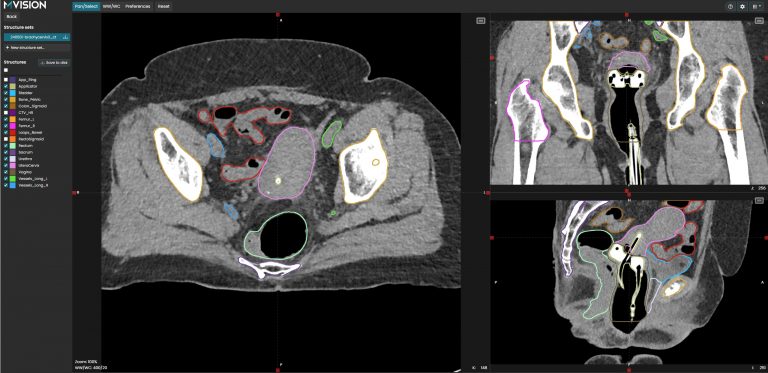According to the NHS, breast cancer is the most common type of cancer in the UK. Roughly 1 in 8 women are diagnosed with breast cancer during their lifetime. However, there is a good chance of recovery if the cancer is detected early. (NHS) The World Health Organization estimates that over 2.3 million women are diagnosed with breast cancer annually worldwide, and in rare cases, men can also be diagnosed with breast cancer. (WHO) This article will address:
- The latest research in radiotherapy as a modality to treat breast cancer
- The results of our latest poll
- MVision’s guideline-compliant AI segmentation breast model
New Research in Radiotherapy for Breast Cancer
For patients with breast cancer, losing their breasts may lead to a decreased self-image and quality of life. (Ng, Sally K., et al.) Nowadays, preservation is possible for most early-stage breast cancer patients through breast contour preservation. (Heeg, E., et al.) A recent, ten-year, randomised control trial conducted following the Cancer Centre, University Hospitals of North Midlands NHS examined the effect of 5 radiotherapy fractions on the whole breast for patients with early-stage breast cancer. Amongst the findings, the researchers discovered that 5 fractions with a dose of 28.5 gy, was just as effective as overall as 25 fractions with a dose of 50 gy. Based on this, it could be less taxing on the patient, while being just as effective to schedule 5 fractions of whole breast radiotherapy. (Brunt, Adrian Murray, et al. )
New trials are ongoing to improve breast cancer patients’ quality of life. Breast-conserving surgery is a less invasive type of surgery for breast cancer and may have fewer side effects and improve recovery. Radiation therapy uses high-energy x rays to kill tumour cells. Giving radiation therapy after surgery may kill any tumour cells that remain after surgery. The Mayo Clinic is conducting a Phase II trial to determine how well breast-conserving surgery and radiation therapy work in treating patients with multiple ipsilateral breast cancer. (Mayo Clinic)
Poll Results
MVision AI always seeks to further understand and address the radiotherapy-related needs of clinicians. To do so, we conducted a poll, via various social media platforms, asking the question: What consensus guidelines does your clinic follow when contouring the breast? Respondents were allowed to provide their own, original response, or to select an answer from the following options: ESTRO, RTOG, RADCOMP, or something else. The MVision AI team appreciated all of the responses from medical professionals around the globe. The results of the poll indicated that respondents contour following :
- 55.6% ESTRO guidelines
- 33.3% RTOG guidelines
- 5.6% RADCOMP guidelines
- 5.6% something else

The Guideline-Compliant AI Segmentation Breast Model
At MVision AI, we value clinicians’ needs and want patients to have the highest quality radiotherapy treatment possible. That is why we developed our guideline-compliant AI segmentation models, your radiotherapy treatment essential. Our breast model covers 18 OARS and 16 lymph node levels, following guidelines, including ESTRO and RTOG.

Are you eager to learn more about GCAIS™? Request a demo here.
MVision AI is active on LinkedIn, Twitter, Facebook, and Instagram. Follow us on social media and subscribe to our newsletter to stay up-to-date on the latest MVision AI news.
Welcome you to contact MVision AI:
c/o Terkko Health Hub, Haartmaninkatu 4, 00290 Helsinki, Finland.
Tel: +358 (0) 40 5489 229
Website: https://www.mvision.ai
Email: info@mvision.ai
For media inquiries:
Tel: +358 40 500 7915
Email: pr@mvision.ai
Sources
“Breast Cancer.” WHO, 26 Mar. 2021, www.who.int/news-room/fact-sheets/detail/breast-cancer.
“Breast Cancer in Women.” NHS, www.nhs.uk/conditions/breast-cancer/#:~:text=Breast%20cancer%20is%20the%20most,detected%20at%20an%20early%20stage. Accessed 30 Dec. 2021.
“Breast-Conserving Surgery and Radiation Therapy in Patients with Multiple Ipsilateral Breast Cancer.” Mayo Clinic, 23 Apr. 2020, www.mayo.edu/research/clinical-trials/cls-20115510.
Brunt, Adrian Murray, et al. “Ten-Year Results of FAST: A Randomized Controlled Trial of 5-Fraction Whole-Breast Radiotherapy for Early Breast Cancer.” Journal of Clinical Oncology, vol. 38, no. 28, 2020, pp. 3261–72. Crossref, doi:10.1200/jco.19.02750.
Erturhan Turk, Kubra, and Meryem Yilmaz. “The Effect on Quality of Life and Body Image of Mastectomy Among Breast Cancer Survivors.” European Journal of Breast Health, 2018, pp. 205–10. Crossref, doi:10.5152/ejbh.2018.3875.
Heeg, E., et al. “Breast-Contour Preserving Procedures for Early-Stage Breast Cancer: A Population-Based Study of the Trends, Variation in Practice and Predictive Characteristics in Denmark and the Netherlands.” Breast Cancer Research and Treatment, vol. 182, no. 3, 2020, pp. 709–18. Crossref, doi:10.1007/s10549-020-05725-z.


